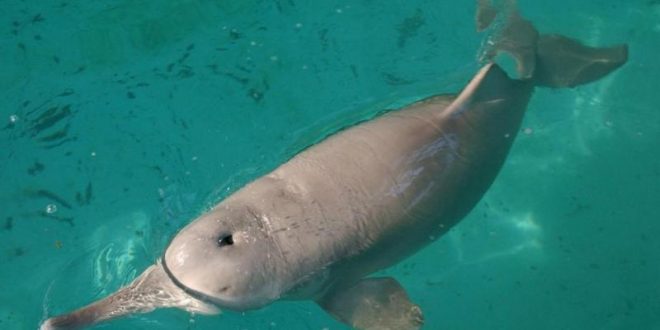A team of Chinese conservationists claims it spotted the baiji – known as the ‘goddess of the Yangtze’ – in a stretch of Asia’s longest river.
According to Chinese legend, baiji was the reincarnation of a drowned princess, and it was considered to be a national treasure. But its habitat, the Yangtze River, the cradle of Chinese civilization, quickly became one of the world’s busiest waterways.
While large-scale economic developments, intensive fishing, agricultural run-offs and industrial pollution led to the drastic degradation of the river system, the biggest threat came from unselective and uncontrolled fishing activities. Therefore, for years conservationists campaigned for the protection of the Baiji. Recommendations included the establishment of an ex situ breeding population away from the main Yangtze channel. But in 2006, an intensive visual and acoustic survey covering 1700 km failed to find any surviving individual.
At around 9:20 a.m. on Tuesday, the team of 11 saw what looked like a dolphin in the Yangtze river close to the city of Wuhu, in Anhui province, while on a one-week expedition to look for the animal. The dolphin jumped out of the water in easy view of one of the team’s boats, which was around 100 meters away. People on the team’s second boat, which was around 300 meters away, also saw the animal.
According to Song Qi, the leader of the expedition, the animal breached the surface of the water more than once, allowing the team to get a good look at it. “I saw most of the body, and the second time around I saw its mouth and head,” Song said in a telephone interview with Sixth Tone. Song was on the second boat which was further away, but team members on the first boat got a better look at the creature. “The front boat saw it three times,” Song said. Song estimated that altogether six people on the investigation team saw the animal.
The team didn’t manage to capture conclusive evidence that what they saw was a baiji dolphin. Song said the camera they were recording with wasn’t able to capture the animal in detail because it was wide-angle. Specialists from CAS’s Institute of Biology are currently examining sonar signals that were recorded by the team on the expedition to look for evidence of the animal.
All members of the investigation team were hobbyists — Song himself works in the publishing industry — and immediately after the sighting, Song contacted specialists at the Institute of Hydrobiology at the Chinese Academy of Sciences in Wuhan, neighboring Hubei province, who arrived to join the expedition on Tuesday afternoon. The investigation concluded on Thursday without any further sightings of the animal.
Tuesday’s sighting provides a glimmer of hope for people like Song, who believe there are still baiji living in the Yangtze, and who want to protect them. Preservationists have previously caught a baiji, in an effort to rear the species in captivity to ensure its survival, but the animal died shortly after being captured.
Despite a lack of concrete evidence, Song is convinced that the animal the team saw was a baiji dolphin. “No other creature could jump out of the Yangtze like that,” Song said. “All the eyewitnesses — which include fishermen — felt certain that it was a baiji dolphin.”
Agencies/Canadajournal
 Canada Journal – News of the World Articles and videos to bring you the biggest Canadian news stories from across the country every day
Canada Journal – News of the World Articles and videos to bring you the biggest Canadian news stories from across the country every day



